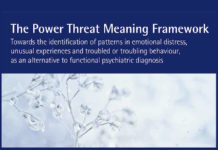55 Steps: A Battle Cry Against Forced ‘Treatment’ For us All
In almost any other situation, pinning people down and injecting them would be cause for investigations and criminal charges. The perpetrators would be seen as aggressors. Those who fought back would be seen as courageous. Those who accepted their fate would be understood. We would draw a line.
Crossing Cultures with the Power Threat Meaning Framework – New Zealand
I have no doubt that New Zealand’s major Government inquiry into mental health will result in some real improvements, but it seems likely to fall short of a fundamental challenge to the diagnostic approach. Nevertheless, if the Power Threat Meaning Framework can help a move in that direction, I and the other authors will be delighted. In the meantime, I will always value the lifelong connection that has now been forged with the marae at Manawanui.
Gaslighting: Should we Label the Victims as Psychotic or Abused?
It took me a long time to realise that I was being gaslighted. In fact, I had no word to describe the experience until years after I had finally escaped, when I came across the term by chance. What is worse, whenever I talk about my past relationship now with friends in my new life, I am horrified to discover how common manipulative relationships are.
Two Years Tapering an Antidepressant – A Life-Changing Experience That I Didn’t Want
My heart goes out to anyone experiencing withdrawal but especially those surrounded by unsupportive judgemental people, and those who are so ill they can’t work and are struggling to navigate a heartless and cynical ‘benefits’ system. Denial and minimisation make it even more difficult for people to access help, support or seek understanding. Their only crime is to have experienced difficulty from a prescribed treatment, yet they are treated as medical pariahs.
We Are All in This Together
We need a new narrative of shared distress to replace the failed one of individual disorders. We need human connection and mutual support. We can learn to manage our feelings in a way that helps us through the crisis and gives us the energy to make much-needed social and environmental changes afterwards. The usual dividing lines melt away in the face of global emergency. We really are all in this together.





